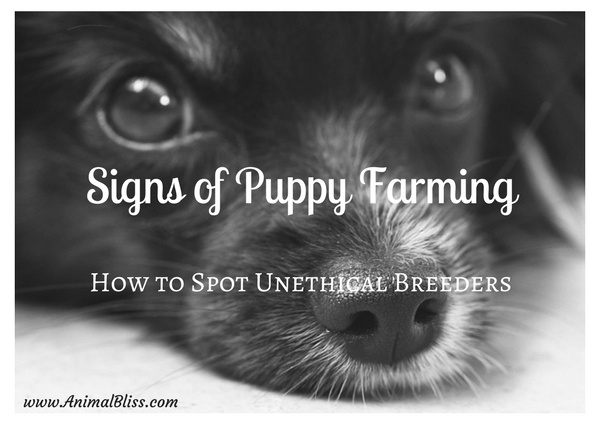Signs of Puppy Farming
~ Spotting Unethical Breeders ~
Rachel Mulheron, Director of Pet Insurance at helpucover, addresses how buyers can know the signs of puppy farming to circumvent disreputable breeders and instead purchase happy, healthy pets from reliable sources.

The challenges to finding your perfect puppy
The latest news has revealed The United States Department of Agriculture has removed thousands of documents, research, and data once available to the public, law enforcement, and animal welfare agencies from its website.
Many relied on this information to enforce certain state laws that say pet stores cannot acquire puppies from commercial breeders that have severe animal welfare violations. To summarize, this means that the worst violators of puppy breeding could get away with unlawful practices. With this worrying news being made public, what can consumers do to know the signs of puppy farming and instead make sure they buy a puppy from a reputable breeder?
RELATED:
Put an End to Puppy Farming
Recognizing an untrustworthy source
False and forged documentation usually accompany dogs from puppy farms, which leads buyers to think they have been imported legally or bred in the USA. Often these animals have not been vaccinated against rabies or have been given vaccinations prematurely, so they are futile. Puppies must be quarantined if found to have been illegally imported, and in these cases, the fees must be paid by the owners.
These puppies are often sold via online and newspaper ads and are a lot cheaper than the U.S. bred puppies of the same breed. Such practices also tend to offer ‘multiple breeds’ for sale. Something unusual to note is that these practices tend to offer ‘multiple breeds’ for sale when even the most experienced breeders only focus on one breed. These are tell-tale signs of puppy farming, and there may be an illegal breeding program in place.

Health and behavioral problems associated with puppy farms
Often puppies from puppy farms can seem okay at first appearance, but progressively often display signs of fatal illnesses. The Humane Society of the United States, summarizing the puppy buyer complaints they received from 2007-2011, specified 40 percent of these puppies contracted diseases such as pneumonia and parvovirus and 34 percent had congenital defects. These facts indicate many dogs may not have been raised by responsible breeders.
All responsible breeders will follow recommended breeding guidelines and make use of health screening schemes, to help owners forecast the puppy’s future health. Your breeder should be able to paint a clear picture of what this encompasses and what they are aiming to accomplish with their dogs.
RELATED:
Puppy Mill Awareness Day
When seeing your puppy for the first time, check their eyes, which should be bright and shiny. While a small amount of mucus and watery tears is normal, any yellow-green pus, a lot of watery eye discharge, or a sticky eye can all be signs of a problem. The pink lining of the eyelids should not be inflamed or swollen.
A healthy coat, whether short or long, is sleek and supple, without dandruff, excessive greasiness or bald spots. There should be no swelling or redness inside the ears, and your puppy shouldn’t scratch its ears or shake its head recurrently.
Dr. John Bradshaw, director of the Anthrozoology Institute at the University of Bristol in the UK, reports on puppy farm breeding practices leading to an increase in hostile and dangerous dogs. If you notice any behavioral issues such as trembling, erratic sleeping patterns, food aggression and lack of height or depth perception, it is likely these are signs of puppy farming, and you have been deceived into buying from a puppy farm.

Prioritize ‘meeting the family’
It is wise to have a vet of your choosing inspect your potential puppy preceding the signing of a sale contract, to identify any possible future complications. If your breeder is professional or semi-professional rather than simply breeding one litter for their enjoyment, they should also be prepared to offer some references from buyers of previous litters. If your seller cannot oblige any of these requests, then it’s best not to take the transaction any further.
The breeder should give you the chance to see the puppy with its mother, the rest of the litter, and if possible the sire. Doing this will give you an idea of the forthcoming characteristics and size of the puppy.
Never agree to have the puppy delivered to your home address, meet the seller to collect the puppy, or pay for the puppy in advance, as these are all basic exercises from puppy farms.
Do your research and fill out the right paperwork
There are ways of guaranteeing you source your puppy from an appropriate breeder, by looking at the AKC Breeder of Merit Program. The AKC provides the most comprehensive and up-to-date list of breeders and available pedigree puppies.
Ask the seller for details of a Contract of Sale before acquiring your puppy. This should detail both the breeder’s and your responsibility to the puppy and make you aware of any caveats in your contract. If your puppy is a pedigree, you will need detailing of your dog’s ancestry, and it is the breeder’s duty to make you aware of any health issues.
If you are in the process of finding a puppy and think you have discovered one which could be from a puppy farm or unethical breeder, contact your local police station or animal charity and report the incident as soon as possible.
“Signs of Puppy Farming – How to Spot Unethical Breeders“
![]()
Signs of Puppy Farming - How to Spot Unethical Breeders Share on X
MY QUESTION FOR YOU:
Have you adopted or purchased your pet(s)?
** Leave your comment below. **
(It’s just sexy!)

![]()
As always, thank you for taking the time to visit my blog!

*
Disclosure: Animal Bliss is an Amazon.com affiliate and will earn a very small (teeny tiny) commission from purchases made through links on this website.
(Coffee money – thank you!)
[amazon_link asins=’0761318631,0985769041,1932904735,B008GQV004,B01MV0IX66,B0727V6B5Q’ template=’ProductCarousel’ store=’animblis-20′ marketplace=’US’ link_id=’1fb74fda-df7e-11e7-90e5-456f31600af5′]
😀
- Mindful Travel With Your Dog This Holiday Season - December 23, 2019
- A-Z of Australia’s Endangered Wildlife - December 20, 2019
- Teaching Your Kids How to Walk the Dog Safely - December 2, 2019

Finding a responsible breeder is important! I know someone with a puppy mill rescue and she has terrible health issues. I can’t imagine her puppies are healthier.
Thank you for sharing this information – all vital stuff that anyone buying a puppy should read x
Thank you for visiting Animal Bliss, Emily! I appreciate you.
You’re welcome, Emily. Thanks for taking the time to visit Animal Bliss today. 🙂
Hi, Bren. I’m so glad to hear you have a rescue dog. A breeder girl for 9 years — how awful for her. She’s lucky to have found you, and vice versa. Love is love is love. 🙂 And yes, I feel sad for puppy farm animals too. They don’t have a very good chance of having a good life. Thank you for passing my post along. It does need to be shared. Peace.
This is great information. I feel like we as pet bloggers can never share enough on this topic. It seems so obvious to so many of us that puppy mills are wrong and harmful to the dogs, but it’s crazy just how many people don’t realize that they actually exist. Puppies are pure and good. Where they come from should be too!
That’s true, Jessica. A lot of people who buy dogs don’t give a second thought about where the dog originately came from. Hopefully, with knowledge will come power and folks will ask more questions when looking for a good dog. Thanks for your visit!
Wow very helpful. I was not even aware of some of these facts. I will definitely be more careful now. Would you file a case if you find an offer that appears to be illegal?
Daniel, thanks for taking the time to have a look at our, “Signs of Puppy Farming” article. Yes, if I had proof that anyone was breeding dogs illegally, I would likely pursue it. Would you?
Yes I think it’s a responsibility to do so.
Daniel, thanks for taking the time to have a look at our, “Signs of Puppy Farming” article. Yes, if I had proof that anyone was breeding dogs illegally, I would likely pursue it. Would you?
Great information, post, I personally will only rescue and not buy from any breeder as there are just so many in the shelters waiting for homes.
It has sickened me as to what is happening at the moment with the removal of all those documents as all those poor animals are now at risk more than ever before.
Oh, yes, Ruth. I agree that there are so many pets in shelters needing loving homes. I would always adopt before buying too (although I did buy a baby Bearded Dragon that looked too cute to pass by). I’m saddened, too, about the documents being removed by the Government. It’s careless and unnecessary. I hope things change soon. Thanks so much for your visit! Come again. 🙂
This is really important information for anyone who’s looking for a puppy. Thank you for sharing!
You’re quite welcome, Christina. Thank you for visiting Animal Bliss today. Peace
Unethical, uncaring, backyard breeders and puppy mills make me so sick. It’s terrible how little they care about the conditions and health of the animals, and are often just in it for the money. These are great tips to help people looking to buy a specific type of dog avoid these kinds of breeders. All of mine are rescue mutts, and I’m okay with that! 🙂
Hey, Debbie! Puppy mills make me sick too. It’s so sad, the conditions some of these animals have to live with (if you call that living). I’m glad you stopped by to read my blog, and I thank you for having rescue mutts of your own. They do tend to be the best pets to have. They’re so grateful. Take care, and come back soon.